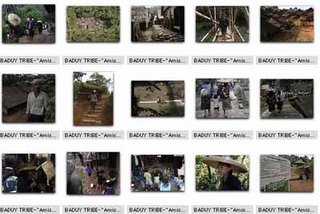BADUY TRIBE-"Amish" of west Java

BADUY TRIBE-"Amish" of west Java
In the world's fourth-most populous country, where nearly 90 percent of the people
are Muslim an enigmatic Indonesian tribe - Baduy tribe (sometimes dubbed the
Indonesian "Amish)- live deep in the remote highland jungles, of Mount Kendeng,
west Java on area of 50 sqkm in isolation since the mid-1500s. And only 150 Km
from capital Jakarta with few signs of modern development, Baduy tribe live much as
their ancestors did hundreds of years ago. Anthropologists think they may be the
descendants of priests from the Java Hindu Kingdom of Pajajaran who fled into west
Java's jungle peaks when Muslim armies overran the region in l578, and forming their
own religious clan based on strict adherence to unique religious beliefs; perhaps
influenced in some ways by the Hindu religion of the Kingdom of Pajajaran before it
fell to the Muslim invaders.
Their ancient, mysterious religion is core of their ethnic identity. Their rigid religion,
a blend of animism and ancient Hinduism, has left them suspended in the past and cut
off from the outside world. Anything modern is taboo. Electricity is outlawed. So is
adultery, soap, four-legged animals, fertilizer, glass, metal cutlery, cutting down trees,
touching money and changing the course of water, poisoning fish and touching the
breasts of a virgin.
At the heart of their universe are the three villages of the Inner Baduy, where
residents adhere to the strictest form of their religion. The Inner Baduy provides the
Baduy tribe governing elite and is famed throughout Indonesia for their skill at magic.
Foreigners are banned here and few Indonesian outsiders manage to penetrate the
inner sanctum. Surrounding and protecting this secret world are the 44 Outer Baduy
villages, acting as a buffer zone and a place of exile for those from the inner sanctum
who break the rules. A serious transgression by one of the Inner Baduy, who wear
white shirts to distinguish them, results in banishment to the outer villages known as
'The land of sinners." Today Inner Baduy (Baduy Dalam), numbering only 350 in
three villages (kampung) in the core area, is the strictest adherents to Baduy spiritual
belief, while the remaining populations live in the Outer Baduy (Baduy Luar) area
numbering only 6500. Inner Baduy are not permitted to wear any cloth but the rough
white homespun they weave themselves. In "the land of sinners" are obliged to wear
only their homespun blue-black cloth, and forbidden to wear trousers, some of the
outer Baduy people now proudly sport the colorful sarongs and shirts favored by their
Sundanese neighbors. Each of the three Inner Baduy villages is headed by a puun, a
hereditary spiritual and temporal leader whose person is sacred. The land within Inner
Baduy territory is also regarded as sacred, and outsiders, including the outer Baduy,
forbidden to till its soil or settle there. Their huts have no furniture, and their
possessions usually extend to a few utensils and minimal clothing, all of which they
traditionally make themselves. They grow rice for food, and rely only on rainfall for
cultivation. Most Baduy are illiterate because their religion forbids education.
Violation of the most serious taboos can lead to permanent exile.
The language of Baduy tribe is Sundanese, one of 300 Java languages spoken before
Bahasa Indonesia is introduced in 1920's. Baduy live in the land they call Pancer
Bumi, the center of the world, since the dawn of time. Inner Baduy villagers take little
interest in the outside world. Many never leave their secret enclave. Most only
travel as far as a nearby market town, where they stock up on salted fish.
The Baduy people are beginning to be influenced by developments in the world
around them, trading activities have been a major catalyst for change, to meet their
daily needs, the Baduy have to increase their relationship with their neighbors. If
supply of food is not adequate, the results can be, seen in one study, Baduy society
can actually collapses in 50 years as the population.

0 Comments:
Post a Comment
<< Home